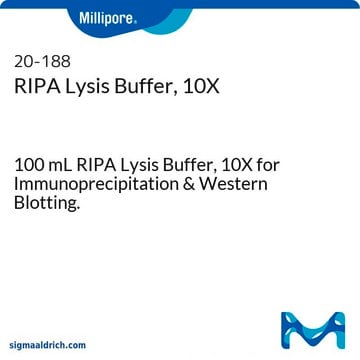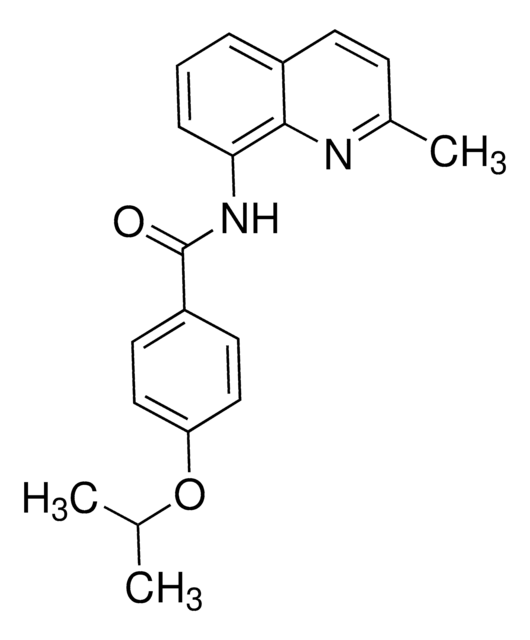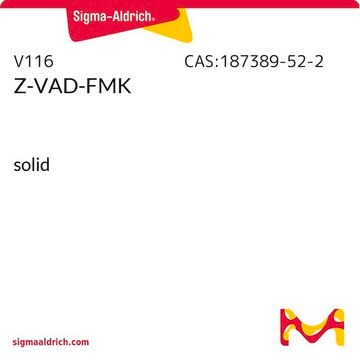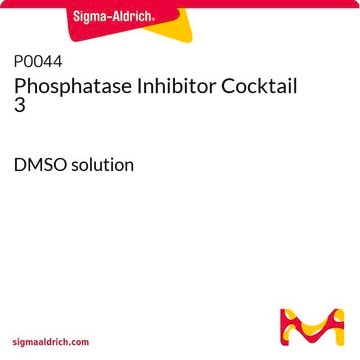SML2100
RIPA-56
≥98% (HPLC)
Szinonimák:
N-Benzyl-N-hydroxy-2,2-dimethylbutanamide, RIPA56
Bejelentkezésa Szervezeti és Szerződéses árazás megtekintéséhez
Összes fotó(1)
About This Item
Tapasztalati képlet (Hill-képlet):
C13H19NO2
CAS-szám:
Molekulatömeg:
221.30
UNSPSC kód:
12352200
NACRES:
NA.77
Javasolt termékek
Teszt
≥98% (HPLC)
form
powder
szín
white to beige
oldhatóság
DMSO: 2 mg/mL, clear
tárolási hőmérséklet
2-8°C
Biokémiai/fiziológiai hatások
RIPA-56 is a metabolically stable type III kinase inhibitor that targets receptor-interacting protein 1 kinase (RIP1; RIPK1) in a highly potent and selective manner (RIP1 IC50 = 13 nM) by locking RIP1 in its inactive form, exhibiting no inhibitory potency toward RIP3, IDO or a panel of multiple kinases (tested at 10, 200, and 5 μM, respectively). RIPA-56 protects against TNFα-induced necroptosis (necrosis) upon apoptosis/NF-κB pathway blockage (EC50 = 27 nM/murine L929 and 28 nM/human HT-29 cells) in cultures as well as TNFα-induced mortality and multiorgan damage in a murine model of systemic inflammatory response syndrome (SIRS) in vivo (100% survival rate with 3 mg/kg/12 h or single 6 mg/kg i.p.) with good pharmacokinetics and bioavailability (F post 10 mg/kg p.o. or i.p. dosing = 22% and 100%, respectively, of 2 mg/kg i.v.). Long-term daily RIPA-56 supplementation (150 or 300 mg/kg in chow) is reported to prevent aging-associated deterioration of the male reproductive system in mice.
Tárolási osztály kódja
11 - Combustible Solids
WGK
WGK 3
Lobbanási pont (F)
Not applicable
Lobbanási pont (C)
Not applicable
Analitikai tanúsítványok (COA)
Analitikai tanúsítványok (COA) keresése a termék sarzs-/tételszámának megadásával. A sarzs- és tételszámok a termék címkéjén találhatók, a „Lot” vagy „Batch” szavak után.
Már rendelkezik ezzel a termékkel?
Az Ön által nemrégiben megvásárolt termékekre vonatkozó dokumentumokat a Dokumentumtárban találja.
Az ügyfelek ezeket is megtekintették
Yan Ren et al.
Journal of medicinal chemistry, 60(3), 972-986 (2016-12-20)
On the basis of its essential role in driving inflammation and disease pathology, cell necrosis has gradually been verified as a promising therapeutic target for treating atherosclerosis, systemic inflammatory response syndrome (SIRS), and ischemia injury, among other diseases. Most necrosis
Bo Yan et al.
Chemical communications (Cambridge, England), 53(26), 3637-3640 (2017-03-08)
We report the development of novel Mixed Lineage Kinase Domain-Like protein (MLKL) inhibitors with single nanomolar potency (compound 15 is also named as TC13172). Using the converting biochemistry to chemistry activity-based protein profiling (BTC-ABPP) method, we were able to determine
Dianrong Li et al.
eLife, 6 (2017-08-16)
A pair of kinases, RIPK1 and RIPK3, as well as the RIPK3 substrate MLKL cause a form of programmed necrotic cell death in mammals termed necroptosis. We report here that male reproductive organs of both Ripk3- and Mlkl-knockout mice retain
Tudóscsoportunk valamennyi kutatási területen rendelkezik tapasztalattal, beleértve az élettudományt, az anyagtudományt, a kémiai szintézist, a kromatográfiát, az analitikát és még sok más területet.
Lépjen kapcsolatba a szaktanácsadással













